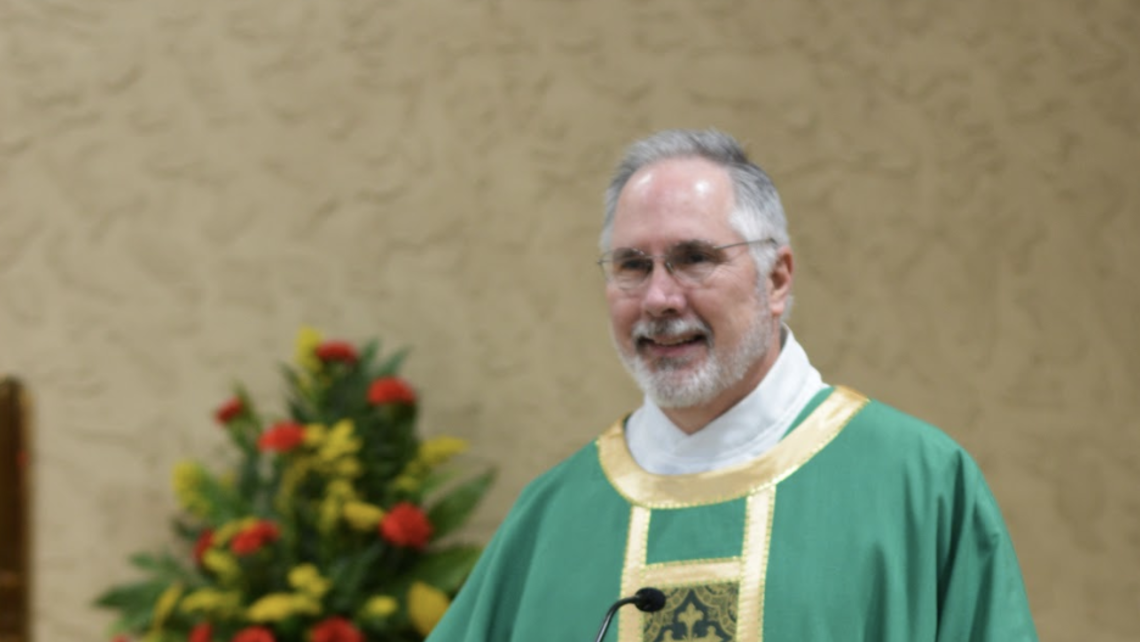
At the beginning of today’s Gospel reading, Jesus moves from Nazareth to Capernaum. This seems like an ordinary event – people move all the time – except that Matthew connects this event with the prophecy of Isaiah: “These people who walked in darkness have seen a great light.” Matthew loves to connect the life and ministry of Jesus with Old Testament prophecy – this challenges us to connect our lives with Scripture and the will of God. There is chronos, clock time and kairos, God’s time. With the internet and social media people have never had so much information on hand but what does it mean? We are disciples – we are called and we are sent; everything in our life should be seen in these terms. How is the Holy Spirit moving in my life? St. Ignatius Loyola taught that at the end of the day we should gratefully consider how the Holy Spirit is moving in our life – and how the Evil One also draws near. This is a spirit of discernment.
Jesus begins to preach, “Repent, for the Kingdom of Heaven is at hand.” What is the Kingdom of Heaven, the Kingdom of God? The Kingdom of God is presence and power of God - that is why Jesus reveals the Kingdom of God in his person and ministry because he is the presence and power of God. When Jesus speaks parables and heals the sick he is making people wonder and be open to the Kingdom. Why does Jesus not heal ALL who are sick? To be a disciple of the Kingdom is to glorify God; Jesus teaches us that when we are well, it is for the glory of God and when we are sick it is for the glory of God. It is not about us but fulfilling the plan of God.
Why must we repent to enter the Kingdom? Jesus says we cannot love God and money. Jesus tells us to seek treasure in heaven where moths and corrosion cannot destroy what we value. We learn, also, to trust in God, not our own resources. Remember when Jesus was teaching the crowd of 5000? He told his disciples to give them something to eat. And Philip said, “300 days wages would not be enough to feed this crowd.” Then Jesus took the bread, blessed it, broke, and shared it with the disciples who shared the food with the crowd. By human means it was impossible to feed the people but nothing is impossible for God. Conversion is about relying on God, not our meager abilities.
Next, Jesus calls his first disciples. Peter, Andrew, James, and John drop everything to follow Jesus. This is a challenge to us to drop our personal interests to be a disciple. These Galileans were fishermen, Jesus told them that they would become fishers of folks. Jesus uses our natural talents for His purposes. This follows the teaching of St. Thomas Aquinas, that grace perfects nature. When we use our talents for God’s purposes our natural abilities are raised to God’s level - we can feed 5000 with a few loaves. I’ve always felt sorry for Zebedee when his sons left him to follow Jesus. Yet, God does not call without providing - we cannot outdo God in generosity. I believe Zebedee blessed his sons when they departed and was blessed in return.
I love the story of A Tale of Two Cities by Charles Dickens in which Dr. Alexandre Manet is falsely accused in the chaos after the French Revolution; he spends ten years in the Bastille prison. When he is released he is very fragile psychologically and when he is stressed, he reverts to his prison activity of making shoes at his cobbler’s bench. Manet’s daughter, Lucy, is very concerned that her father may retreat to the comfort of his cobbler’s bench and shut himself off forever from his family. Lucy confides in the family Lawyer, Jarvis, who in turn has a word with Manet. “My Friend,” says Jarvis, “Lucy is distressed that you may favor the comfort of making shoes to her love and affection.” Manet said, “I had no idea that I was so distressing my daughter.” With that, he took an ax to his cobbler’s bench and threw it in the fireplace. My dear brothers and sisters, The Reign of God demands every bit of our love and devotion. When the Lord calls, we much take an ax to our comfort and say, “Here am I Lord, I come to do your will.”
Let us meditate on the Prayer of Abandonment by Charles de Foucauld:
Father,
I abandon myself into your hands; do with me what you will.
Whatever you may do, I thank you:
I am ready for all, I accept all.
Let only your will be done in me, and in all your creatures.
I wish no more than this, O Lord.
Into your hands I commend my soul;
I offer it to you
with all the love of my heart,
for I love you, Lord,
and so need to give myself,
to surrender myself into your hands,
without reserve,
and with boundless confidence,
for you are my Father.

